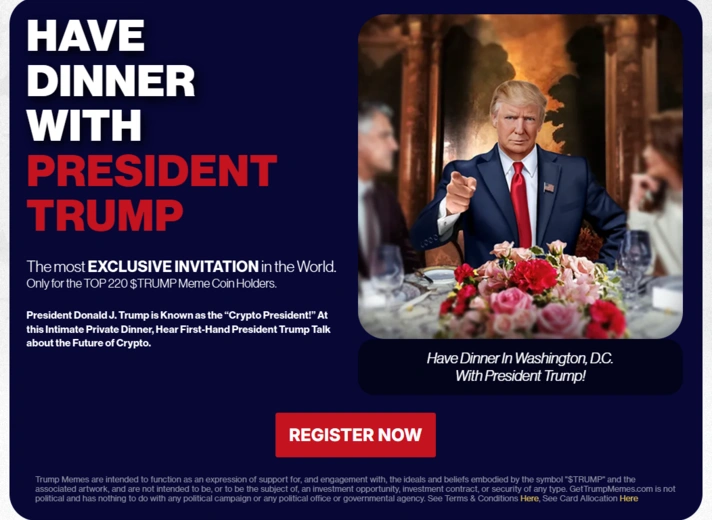Buyers of $TRUMP, President Donald Trump’s meme coin, met at his private country club on the Potomac River on 22 May for an exclusive, highly priced dinner.

220 investors spent an estimated $148 million on $TRUMP for the opportunity to dine in the same room as him. The top 25 of them spent more than $111 million, according to crypto intelligence firm Inca Digital.
Trump—who used to speak out against cryptocurrencies—has reinvented himself as “the crypto king” with family-related interests across various digital assets. The eponymous meme coin was introduced three days before the presidential inauguration in January and was initially rumoured to be a hoax, given the potential conflicts of interest that might arise from a serving US president issuing his own private currency.
The President further tested Americans’ ethical boundaries buy encouraging people to pay to meet with him over dinner, for example in posts on his social media platform.
Their buying prompted further interest in the coin, generating more than $1.3 million in trading fees during the week after the announcement of the dinner, according to blockchain analytics firm Chainalysis. The same firm found that CIC Digital LLC and Fight Fight Fight LLC, which are affiliated to the Trump family, have earned $320.19 million from the coin to date and collectively own 80% of the remaining $TRUMP tokens.
$TRUMP hit a three-week high of $15.70 as the dinner started, according to CoinMarketCap, though that is still a long way from the Inauguration Day peak of $45.47.
Foreign investors
Most of the attendees of the 22 May dinner have remained anonymous, though 19 of the top 25 guests, and around half of all of them, had bought the coin using foreign exchanges that are, in theory at least, not accessible to anyone living in the US. Trump's political opponents have argued that this purchase of access by foreigners is explicitly prohibited by the US Constitution.
The New York Times identified Europe and Asia-based investors from email addresses on an invitee list, citing, among others:
- Evgeny Gaevoy, founder and CEO of Wintermute, a digital asset firm
- Cheng Lu, a crypto investor from Shanghai
- Sangrok Oh, CEO of Hyperithm, which manages digital assets from bases in Seoul and Tokyo
- Asher Ang and Lean Sheng Tan, of hedge fund Hyper-Alpha, based in the British Virgin Islands
- Kain Warwich, a crypto entrepreneur in Sydney and founder of Synthetix
- Vincent Liu, chief investment officer at Taiwan-based Kronos Research
- Christoph Heuermann, a tax advisor who arrived from Germany.
One guest who wasn’t shy about attending was Justin Sun, originally from China now a citizen of St. Kitts and Nevis. He said he was the biggest investor at the dinner, with an $18.5m wallet. He is also a well-known investor in World Liberty Financial, the Trump family cryptocurrency platform. In February, the Securities and Exchange Commission (SEC) paused its fraud investigation into Sun.
Blurred ethics
Another known attendee was Ogle, a pseudonymous crypto cybersecurity expert, although he typically covers his face with a bandana and sunglasses to maintain his anonymity.
Democrats criticized the Trump administration for what they say blurs the ethical boundaries between official and private business.
The White House insisted Mr Trump attended the event "in his personal time”, although the lectern Trump stood behind depicted the presidential seal and he was transported by the US military on a Marine One helicopter. Although it is unclear whether this was an official event or not, his presence in a personal capacity would put the event outside the Supreme Court’s immunity for acts taken in office.
Orgy of corruption
There were protests outside the venue, with Sen. Elizabeth Warren describing the event as an "orgy of corruption". Her fellow Democrat, Sen. Jeff Merkley, said, “This is the Mount Everest of American corruption. This isn’t about raising money for a campaign. This is about personal profit, and what he’s selling is influence on himself and his Cabinet and the US government.”
Ogle, however, said the dinner was no different to the donor and lobbyist dinners that regularly take place in Washington.
Analysis of the Solana blockchain suggests most of the wallets used by the guests to secure their places at the dinner have been burned, meaning the coin holdings have been sold. This indicates it was more about access than a love of crypto. The coin traded below $13 on Friday, the day after the event.







